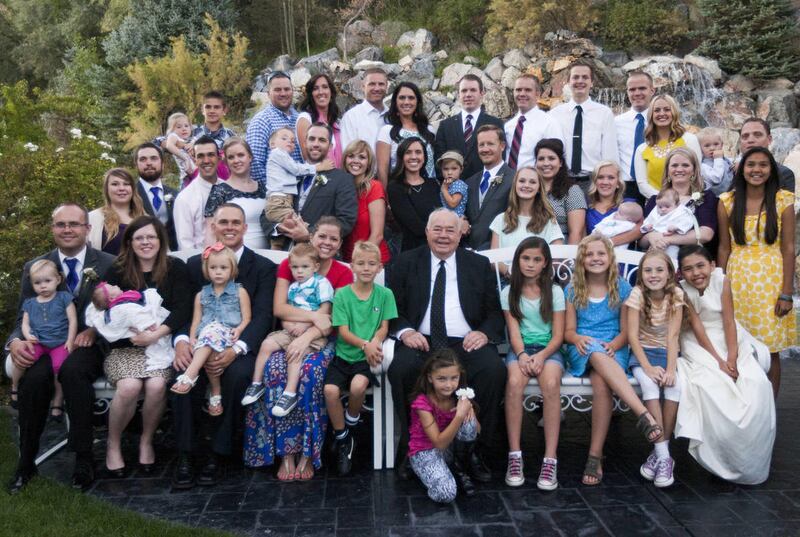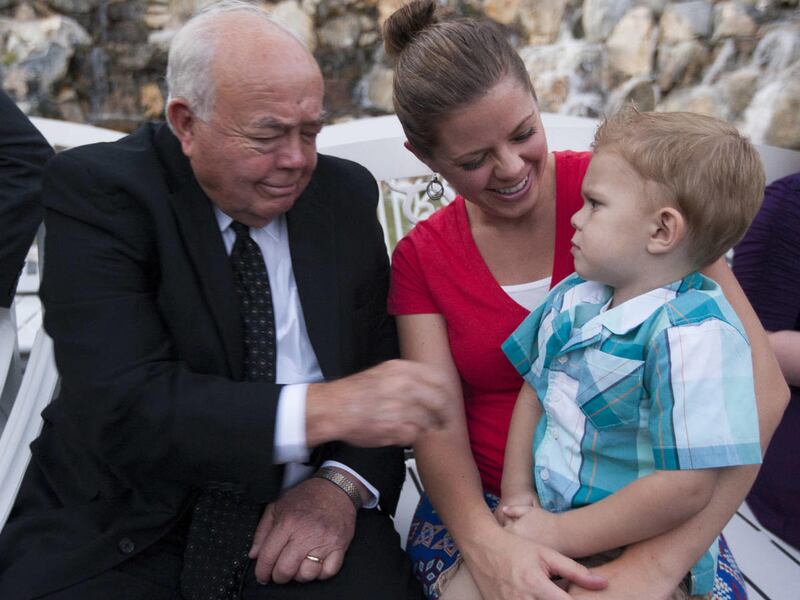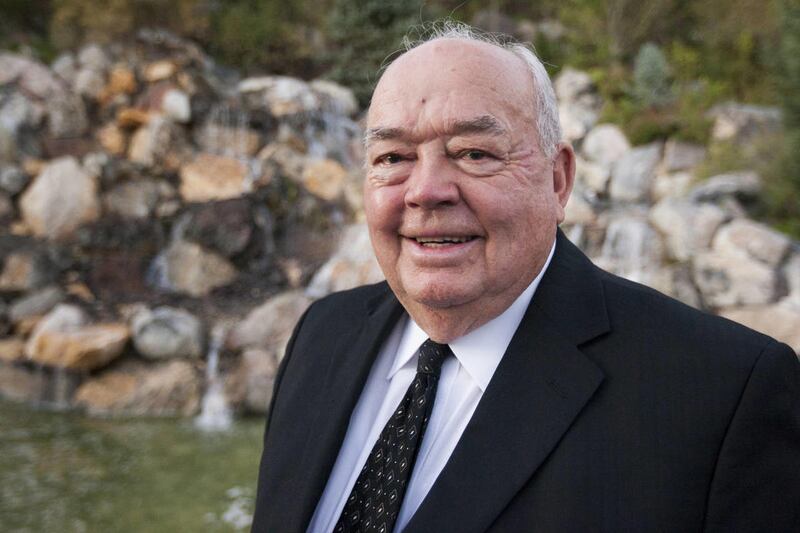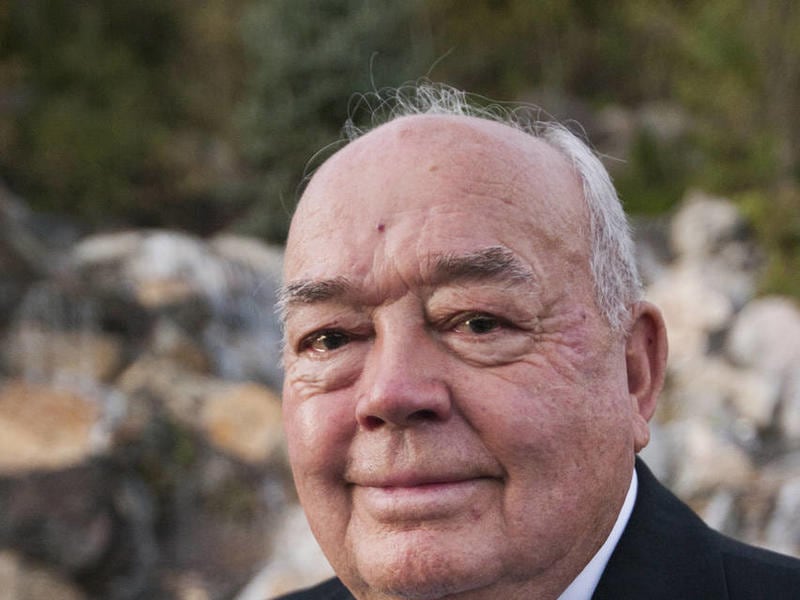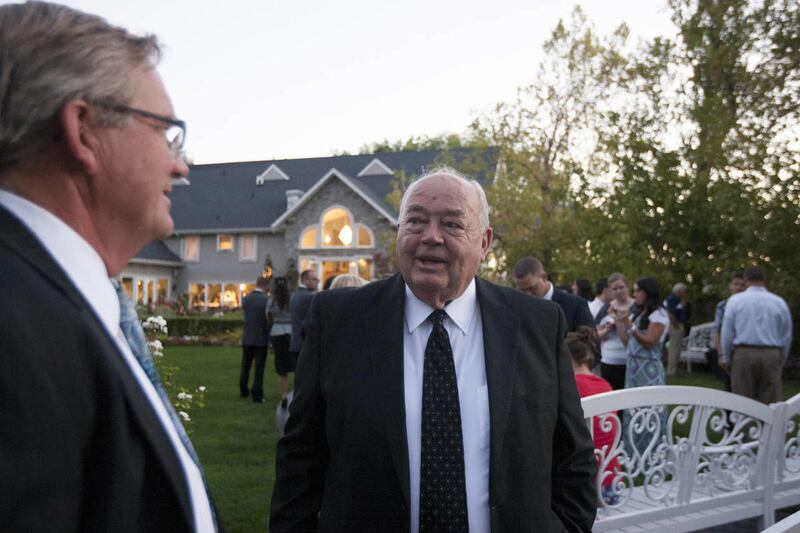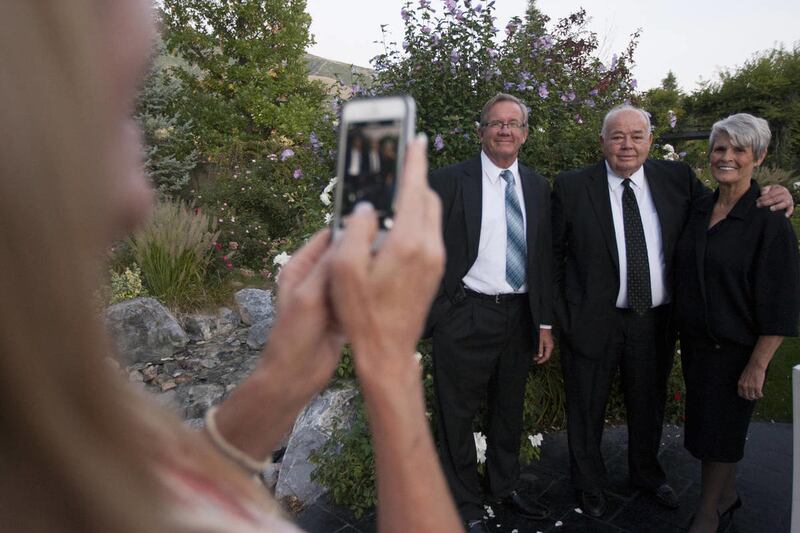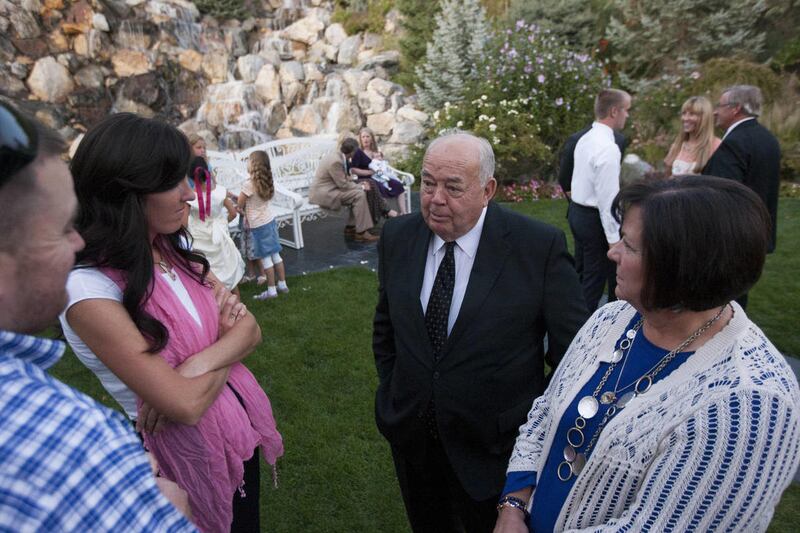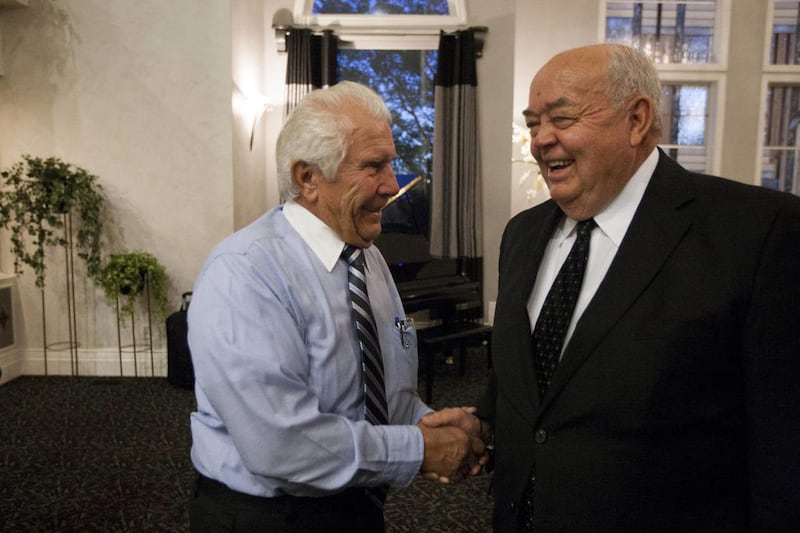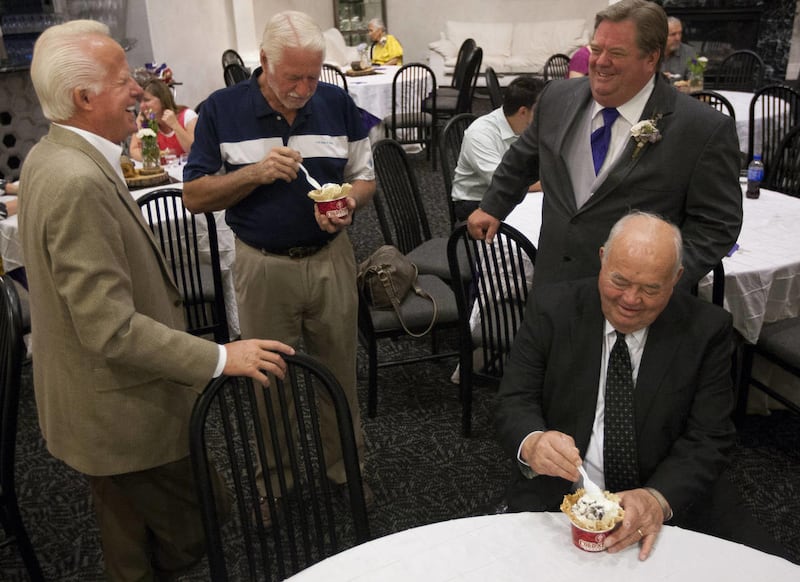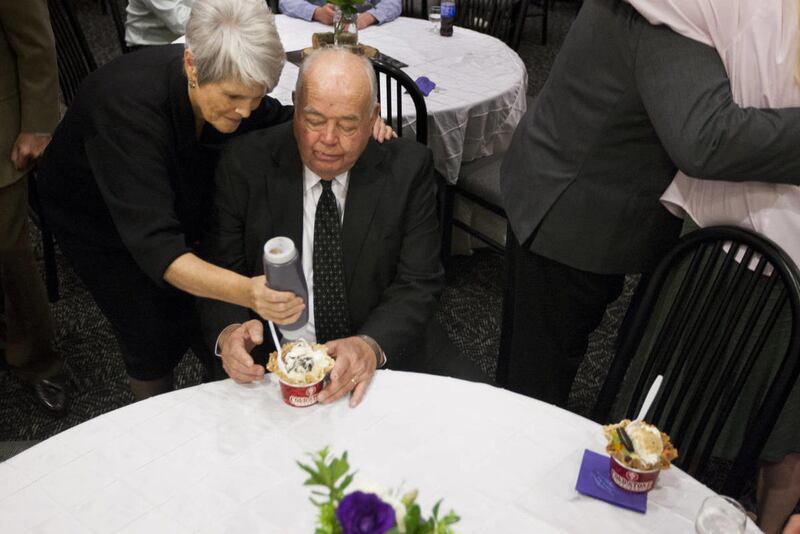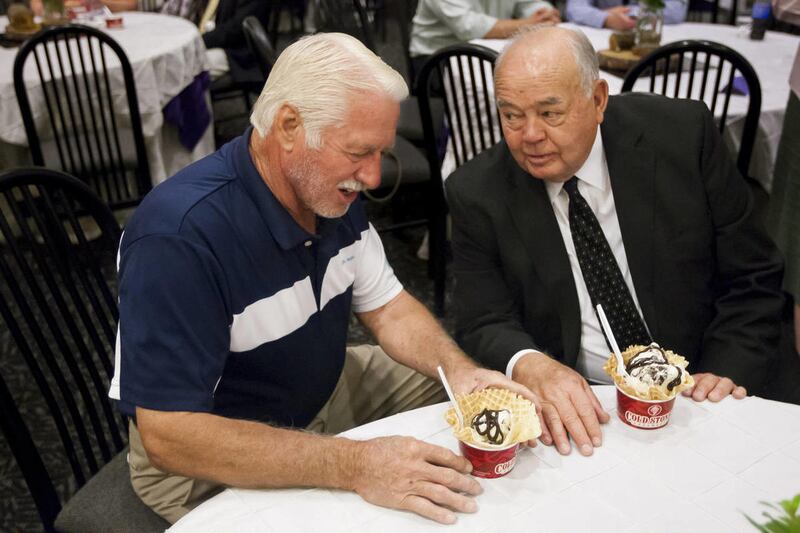It’s been more than two decades since Norm Bangerter was Utah’s two-term governor, but everywhere he goes people still recognize him, or think they do. He was stopped three times at a Fillmore Maverik the other day. “Wish you were back in politics,” one man told him. He was in a crowded elevator once when a woman asked him, “Anybody ever tell you you look like Norm Bangerter?”
“I get told that once in a while,” Bangerter replied.
“He’s dead, isn’t he?” said another woman who was listening.
“I hope not.”
One day a man recognized Bangerter and said, “I didn’t vote for you.”
“That’s OK,” Bangerter said, “I didn’t need your vote.”
Bangerter lives in a large ranch house in a South Jordan neighborhood on a street called Congressional, about six blocks from the highway that bears his name. He’s a regular citizen now, but wasn’t he always? He’s still in the phone book — just as he was when he was in office. People would ask him, “How can I get a hold of you, Governor?” and Bangerter would say, “I’m in the phone book.”
A stranger once looked up Bangerter's number and called him at 3 a.m. to complain about something the governor had done and by the time he was finished the man was so mollified he said, “I’ll never bother you again.” Bangerter could always do that. He was reasonable and down to earth and, well, a lot like the rest of us. He was, in his words, “just an old farmer and carpenter” who wound up living in the governor’s mansion.
“He’s a good guy and he’s unpretentious,” says his daughter Ann, summing up the universal feeling about the man.
“One of the most honest men I’ve ever met, in politics or anywhere else,” says Dan Jones, the longtime pollster and student of Utah politics.
Bangerter is 81 years old, a relaxed, understated man with a gentle western drawl and a dry wit who is content with a life that he filled with public and church service — 18 years as a bishop or stake president for The Church of Jesus Christ of Latter-day Saints, 18 years as a legislator or governor, three years as an LDS mission president — and somewhere in there he owned and operated construction and real estate development businesses.
“I’ve had a good life,” he says, sitting in his living room. “I’ve been fortunate. We have a good family and good friends.” He pauses and adds, “Of course, my life has changed a lot.”
Colleen, his wife of nearly 58 years, passed away in July 2011 of Alzheimer’s. Six months after she died, Bangerter married Judy Phelps, an attractive, energetic 64-year-old divorcee who was Colleen’s best friend, caretaker and assistant. Their union caught everyone by surprise, but was immediately embraced by family. Colleen and Judy are an essential part of any telling of Bangerter’s story, but more on that later.
The Bangerters fill their days by working in the LDS Church’s Jordan River Temple and by keeping up with their large combined family, which numbers more than 100, including 46 grandchildren. Which is why Bangerter has filled his backyard with basketball and volleyball courts and a giant swing set.
"Norm's favorite thing is to have the grandkids over," says Judy. "He loves to look back there and see the kids playing."
The walls of the Bangerter home are decorated with family photos and signs — "Love one another" and "Families are forever" — and the famed print of Washington praying beside his horse. In a concession to age, he no longer golfs or owns horses or snowmobiles, as he once did, and he has little interest in travel — he’s done plenty of that — preferring church work and grandkids instead, along with trips to the family’s cabin and a second home in St. George.
On a quick tour of the home, he leads a guest to an oversize garage, where he points to two boats. He has owned them for some 40 years and he is fond of them, talking up their longevity and the family trips to Flaming Gorge. He moves slowly and gingerly down the stairs to the basement, where he keeps his memorabilia (“I’m overweight, but other than that my health is fine,” he says). There are 60 photo/clip albums that were compiled by staffers, and various saddles, statues, pistols and artwork that were given to him.
“I think about it, but I try not to dwell on it,” he says of the past. “I believe you go forward in life; don’t go back. Somebody asked me what I want to be remembered for. People who worry about being remembered ought to be forgotten rather quickly.”
He had no plans for a political life as a young man. He was a hard-working carpenter who had grown up on a 60-acre farm in Granger, the 10th of 11 children in an industrious family of humble means. He started his own construction business, performing the manual labor in the morning and devoting himself to the business side of the company in the afternoon, a routine he practiced into his mid-30s. He laid brick, shingled roofs, dug and poured footings, and plumbed, wired and framed houses.
In the winter, when construction slowed, he took college classes. At the age of 28, with four of his six children already born (plus a child they would adopt), Bangerter was called to serve as a bishop, so he quit school to make room for his church job. That was his life for the next 13 years — church, work and family.
At the age of 41, with his business doing well, he found himself wanting a new challenge. Bangerter, who had learned the political game as a delegate, considered running for the state legislature as a Republican in a predominantly Democratic district. He watched until the last day of the filing deadline to see if a Republican would enter the race, and when that didn’t happen he called a legislator and asked, “How do I file?” He spent $1,150 on his campaign, $800 of it out of his own pocket, which consisted mostly of dropping flyers on doorsteps. Bangerter thought he knew enough people that he could win to overcome party loyalty, but he was slow to gain traction. Two weeks before the election he asked a friend to vote for him.
“What are you running for?” he asked.
He watched election results on TV in his basement, unaware that the party was holding a reception at a hotel. Democrats, capitalizing on Nixon and Watergate, were winning most of the seats, and by midnight Bangerter trailed by 300 votes. “Well, that was a short political career; let’s go to bed,” he told Colleen. He was just getting into bed when the phone rang — a political friend called to tell him he trailed by just 30 votes. He gave him a phone number for election central.
“I dialed my rotator phone for one hour to get in and when I got in I was five votes ahead,” he says. He won by 369 votes.
He served in the Legislature from 1975 to 1985, the last four as speaker of the House. He became chairman of a subcommittee established to curb big medical malpractice lawsuits, largely because no one else wanted the job. He met with doctors and lawyers and businessmen to educate himself on the issues and eventually sponsored a bill that was passed into law.
“From that I learned you have to have information,” he says. “You can’t think you know the answer because sometimes you don’t even know the question. That was a real turning point for me.”
The story goes that one evening when Bangerter was late for a black-tie affair that was being hosted by a prominent woman and patron of the arts, the host called and left a message with his secretary: “You tell that carpenter from West Valley to get up to my dinner right now.”
The carpenter became governor in 1985 — the first Republican in 20 years to hold the office — and watched as a perfect storm of events put the Utah economy in the toilet. Kennecott and Geneva Steel Mills closed, the oil industry tanked, and Thiokol was reeling in the wake of the space shuttle accident.
“So I did what no politician wants to do — I cut everybody’s budget significantly and raised everyone’s taxes,” Bangerter recalls. “It was not a winning strategy. I wasn’t very popular when I was governor. My approval rating went from 75 percent to 41 in three weeks. It took two years to get it over 50 percent again. … Everyone wanted to know why I cut the budget. ‘Cause I didn’t have the money to pay for it. I didn’t like it, but it’s just like a household — if you spend more than you have, you’re in trouble. You can’t solve everyone’s problems.”
Another hallmark of the Bangerter years: He spent $60 million to pump floodwaters off the Great Salt Lake onto the Bonneville Salt Flats. It proved controversial when the levels of the lake subsequently dropped and the pumps were rendered useless. It was viewed as wasteful, but it solved the problem at the time.
With all those things working against him, Bangerter faced strong challenges from Ted Wilson and Merrill Cook in the run for a second term. He was 35 points behind in the midsummer polls. He won by two points.
“One of the greatest comebacks I’ve ever seen,” says Jones, who remembers Bangerter was shocked when he saw the summer polls.
Asked for his reflections on Bangerter, Jones says, “Norm was the people’s governor. He had been a very successful speaker of the House. Many legislators and public officials would seek his advice. That carried over into being governor. He had the ability to talk to people and make them feel special. He was very down to earth and understood where they were coming from. And he understood the basics of economics and how to keep the state out of debt and provide programs that were meaningful.”
Bangerter had a reputation for being even-handed even among political rivals such as Eddie Mayne, an influential Democratic state senator and union president. Dying of cancer, Mayne asked Bangerter to offer a prayer at a party honoring him at the Grand America Hotel.
Bangerter also had a reputation for one-liners and he didn’t disappoint on that occasion. “Before I pray, I want you Democrats to know that I’ve been praying for you privately, so I’m happy to do it publicly,” he told the audience.
Bangerter turned 60 the day he left office. He turned to the real estate development business, but three and a half years later he was called by to serve as president of the South Africa Johannesburg Mission for the LDS Church. With Colleen by his side, he served there for three years, returning to Utah in 1999. A few years later Colleen was diagnosed with Alzheimer’s.
She was sick the last six years of her life and during the last few months, she no longer could speak or recognize acquaintances, although she knew Norm right to the end. She had been beside her husband for nearly six decades and raised their seven children and served as Utah’s First Lady while also watching out for family interests.
“Norm is an amazing man, and honestly I feel like he was so amazing because he had Colleen as his partner,” says Judy. “He had the most amazing wife in the world. I believe that completely. People can learn from her as someone who was a wonderful mother and helped her man achieve what he can achieve. She went to all of Norm’s staff meetings to ensure the family interests were considered and that her schedule and his matched so they could be together.”
Judy lived in the Bangerters' neighborhood for 40 years and helped run the governor’s campaign before she became Colleen’s official assistant and unofficial sidekick. “She ran the mansion,” says Bangerter. Judy moved into an apartment on the backside of the Bangerter house to care for Colleen the last five months of her life. She bathed her daily. She did her nails. She fixed meals.
Says Bangerter, “When Colleen passed away, my daughters told Judy, ‘Stay there and keep the house clean and don’t let it smell like an old man’s house; see that he eats.’ ”
So she remained after Colleen was gone and watched over Bangerter. Then, only three months later, there was an awkward transition from friendship to something else. Bangerter asked her to go for a drive; she thought they were going to clean the family cabin, but once there Norm reached for her hand.
“I was aghast,” she says. “I thought he’d lost his mind. Then he said, ‘I guess I should ask you for a date.’ ” Judy lost eight pounds in four days as she pondered this strange turn of events, but a courtship had begun. She worried about what people would think.
Two months later Bangerter proposed to Judy. “Let’s do a lot of good and have a lot of fun,” he said. They married (“very quietly,” says Judy) on Jan. 14, 2012, in a family-only ceremony in the Bountiful Temple. Some acquaintances still don’t know they’re married and know Judy largely as “Colleen’s Judy,” from her days as her assistant.
“I had never thought of Judy that way of course,” says Bangerter. “But it seemed kind of natural. She knows my kids. It was an easy transition because she’s great with my kids. My kids all loved her and she stepped right in. She’s easy to be around. My biggest asset and biggest problem is my wives are more popular than me. She’s a good lady. My daughters told her she shouldn’t have married me because I paid her more before.”
Says Ann, “A lot of us were surprised, but we didn’t want our dad to be alone, because he’s not an ‘alone person.’ It’s worked out great. We are all so grateful to Judy. She takes such great care of our dad and we love her and her kids. It’s been good. Judy is fabulous.”
Out of love and respect for Colleen, Judy has left the house pretty much the way Colleen left it, and there are several photos of Colleen on display. “I wish she would change more things and make it more her house, if she wants to,” says Ann.
Says Judy, “When Norm approached me I about had a heart attack, but we’re right where we’re supposed to be. Colleen was in charge of this. She knew Norm couldn’t live alone. Colleen was in this.”
With another woman by his side, life goes on for Bangerter, the old farmer and carpenter from West Valley.
Doug Robinson's columns run on Tuesdays and Wednesdays.
Email: drob@deseretnews.com

